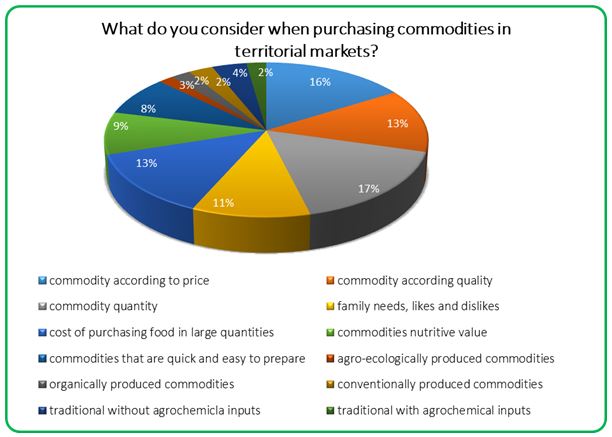Connecting consumer purchasing decisions with production practices
Agriculture and food systems will become more profitable for many farmers once they start getting a correct sense of what consumers really. At the moment, of the main limitations is weak links between production plans and expectations from the market. This is worsened by the competitive ways in which most agricultural production practices are promoted or marketed. For instance, persuasive advertisements through media and agriculture shows are designed to increase profit for input suppliers as opposed to improving the fortunes of farmers. To a large extent, farmers are not protected from misinformation conveyed by competing seed companies.
What influences consumer purchasing decisions?
A recent study by eMKambo revealed that most consumers who buy food from mass markets or territorial markets do not consider production practices as a determinant of their purchasing decisions. The majority of consumers consider commodity price, quantity, quality, family needs and easy with which the commodity is prepared. There is no doubt that farmers need such intelligence.

Need for consumer preference assessments
What is often missing in most markets is support for developing pathways of packaging expectations like volumes needed by the market or consumers per time and types of commodities and varieties so that farmers are informed regularly. At least African mass markets are trying to become good at connecting farmers and consumers through commodities. That is how some farmers realize a commodity is not favorable to consumers when it fails to out-compete other commodities or varieties. Such intelligence may not come from seed companies whose main goal is selling seed irrespective of how consumers will appreciate commodities from that seed.
That is why conducting consumer preference assessments and making sense of consumption patterns can help farmers a lot if well packaged. Sometimes farmers produce the same varieties and same quantities only to see mismatches upon arrival at the market. It is unfortunate that most African planning decisions lag behind consumer preference and expectations. For instance, when promoting alternative agricultural practices like agroecology, an ideal strategy can be using the supply chain approach where promotion will start from the market, understand consumer tastes and preferences. Understanding what customers prefer makes it possible to increase awareness of what they do not know.
Case for reversing the dominance of foreign production practices
Aggressively persuasive marketing by big corporates, governments and some development organizations promoting imported productions practices has been undermining African indigenous production practices for centuries. It is only in recent years that some indigenous people and organizations have started waking up to the devastating effects of imported practices including consumption habits. With enough political will, African governments can also advance agroecology and other alternative practices by allocating huge tracts of land like estates to the production of agroecology commodities like traditional grains.
Just as African farmers were brainwashed to embrace imported practices which they are using to replace indigenous practices, the faster way of changing farmers’ practices is to first influence demand so that once consumers indicate preference for agroecology commodities, farmers will definitely respond. Traders and consumers buy their commodities from farmers who produce using different production practices. However, the targeted demand side (consumers and traders) have great influence on what farmers do to meet market expectations just like what they do when selecting commodity varieties to grow. While consumers have other considerations when buying commodities produced using different practices, consciousness about climate change will soon sway consumers toward food produced in climate-friendly ways like agroecology.
charles@knowledgetransafrica.com / charles@emkambo.co.zw /info@knowledgetransafrica.com
Website: www.emkambo.co.zw / www.knowledgetransafrica.com
Mobile: 0772 137 717/ 0774 430 309/ 0712 737 430
